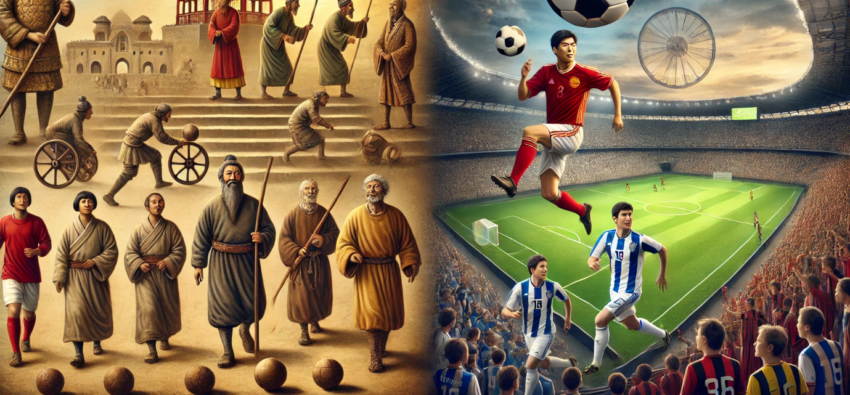| Listen to our audio presentation: History of Futbol |
Football, known as soccer in some parts of the world, is the most popular sport globally, captivating billions with its simplicity and universal appeal. Its history is rich and diverse, stretching back thousands of years and evolving into the modern game that commands a vast following today.
Ancient Origins
The roots of football can be traced to ancient civilizations where various forms of ball games were played. In China, during the Han Dynasty (206 BCE – 220 CE), a game called “Cuju” involved kicking a leather ball into a small net. Similar games were played in ancient Greece and Rome, where they were part of military training exercises. The indigenous peoples of the Americas, such as the Aztecs, also played ball games that bore a resemblance to football.
Medieval and Early Modern Europe
Football in its early forms was a chaotic and often violent activity played during festivals and religious occasions in medieval Europe. Known as “mob football,” these games involved large groups of players, minimal rules, and were often banned by local authorities due to their disruptive nature. Despite these bans, the game continued to be played, gradually evolving over the centuries.
The Birth of Modern Football
The modern game of football began to take shape in the 19th century in England. Public schools and universities started to codify the rules, leading to the formation of clubs and organized competitions. The pivotal moment came in 1863 when the Football Association (FA) was founded in London. The FA established a standardized set of rules, distinguishing association football from rugby football, which had different regulations.
International Expansion
Football quickly spread beyond England, becoming popular across Europe and Latin America. The first international match took place in 1872 between England and Scotland. The sport’s global appeal was cemented with the formation of the Fédération Internationale de Football Association (FIFA) in 1904, which aimed to govern and promote football worldwide.
The World Cup and Global Popularity
The inaugural FIFA World Cup was held in 1930 in Uruguay, featuring teams from Europe and the Americas. The tournament has since become the most prestigious event in international football, held every four years and drawing massive global audiences. Legendary players like Pelé, Diego Maradona, and more recently, Lionel Messi and Cristiano Ronaldo, have become household names, further popularizing the sport.
Evolution of the Game
Football has undergone significant changes in terms of rules, tactics, and technology. The introduction of the offside rule, changes in ball design, and the use of video assistant referees (VAR) are just a few examples of how the game has evolved. Professional leagues like the English Premier League, La Liga, and Serie A attract top talent and generate substantial economic impact.
Women’s Football
Women’s football has seen tremendous growth and increased recognition. The first Women’s World Cup was held in 1991, and since then, the sport has gained popularity and support. Major tournaments like the FIFA Women’s World Cup and the UEFA Women’s Champions League showcase the skill and competitiveness of female athletes, inspiring a new generation of players.
Football’s Cultural Impact
Football’s influence extends beyond the pitch, impacting culture, politics, and society. The sport has the power to unite people across different backgrounds and cultures, fostering a sense of community and shared identity. It also serves as a platform for social issues, with players and clubs often advocating for causes such as racial equality and humanitarian efforts.
The history of football is a testament to its enduring appeal and adaptability. From its ancient origins to its status as a global phenomenon, football continues to captivate and inspire millions around the world. Its simplicity, combined with its capacity to bring people together, ensures that the beautiful game will remain a vital part of human culture for generations to come.

